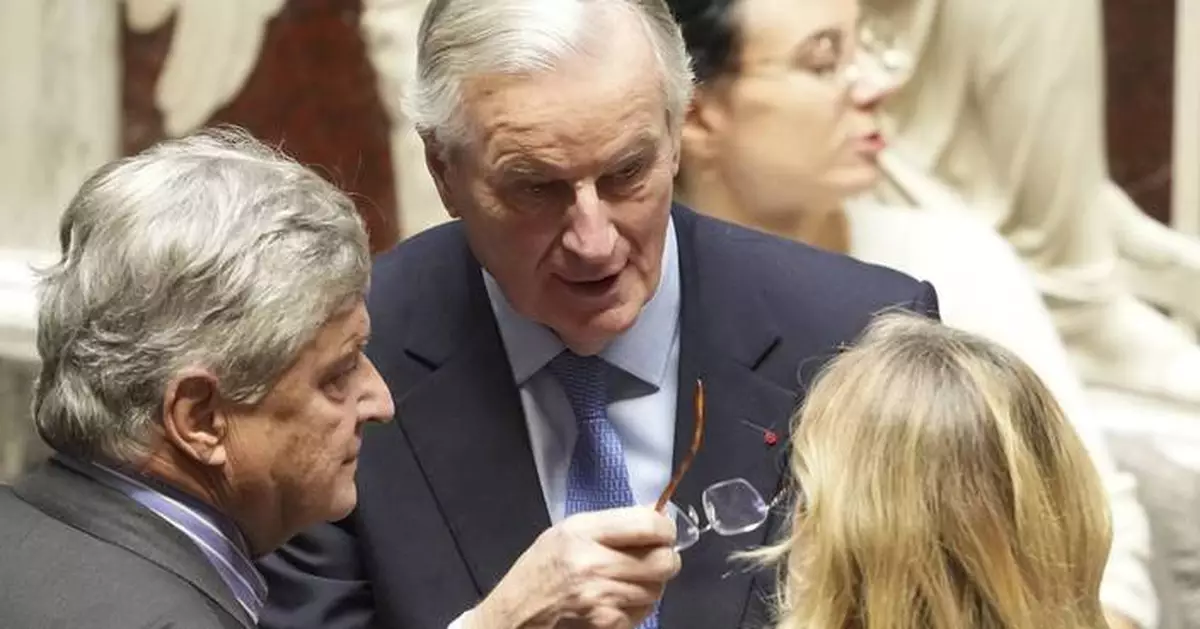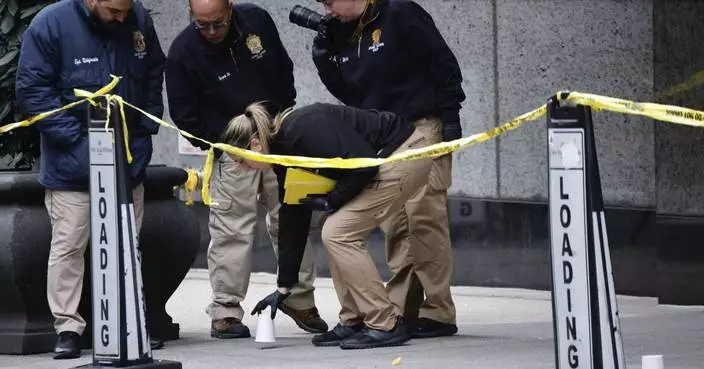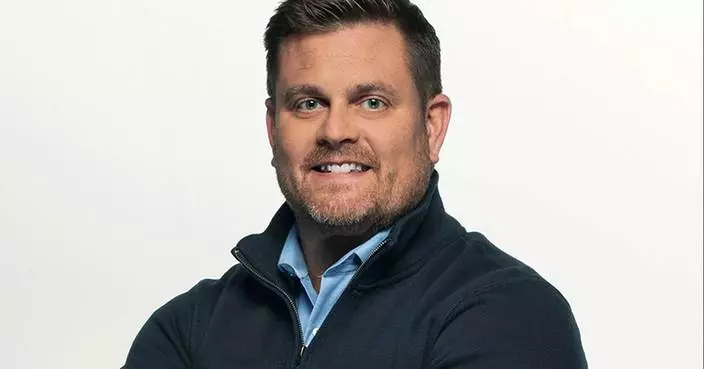PARIS (AP) — France’s far-right and left-wing lawmakers joined together Wednesday in a historic no-confidence vote prompted by budget disputes that forces Prime Minister Michel Barnier and his Cabinet members to resign, a first since 1962.
The National Assembly approved the motion by 331 votes. A minimum of 288 were needed.
Click to Gallery
French far-right leader Marine Le Pen, center, applauds with other National Rally parliament members during conservative lawmaker Eric Ciotti's speech prior to a vote on a no-confidence motion that could bring him down and his cabinet for the first time since 1962, Wednesday, Dec. 4, 2024 the National Assembly in Paris. (AP Photo/Michel Euler)
National Assembly president Yaël Braun-Pivet announces the results after France's far-right and left-wing lawmakers joined together to vote a no-confidence motion prompted by budget disputes that forces Prime Minister Michel Barnier to resign, Wednesday, Dec. 4, 2024 in Paris. (AP Photo/Michel Euler)
French far-right leader Marine Le Pen poses prior to an interview on French TV channel TF1, in Boulogne-Billancourt, outside Paris, Wednesday, Dec. 4, 2024 after France's far-right and left-wing lawmakers joined together to vote a no-confidence motion prompted by budget disputes that forces Prime Minister Michel Barnier to resign. (Stephane de Sakutin, Pool via AP)
French far-right leader Marine Le Pen poses prior to an interview on French TV channel TF1, in Boulogne-Billancourt, outside Paris, Wednesday, Dec. 4, 2024 after France's far-right and left-wing lawmakers joined together to vote a no-confidence motion prompted by budget disputes that forces Prime Minister Michel Barnier to resign. (Stephane de Sakutin, Pool via AP)
A scoreboard at the National Assembly shows the results of a no-confidence motion vote prompted by budget disputes that forces Prime Minister Michel Barnier to resign, Wednesday, Dec. 4, 2024 in Paris. (AP Photo/Michel Euler)
French Prime Minister Michel Barnier addresses the National Assembly prior to a vote on a no-confidence motion that could bring him down and his cabinet for the first time since 1962, Wednesday, Dec. 4, 2024 in Paris. (AP Photo/Michel Euler)
French Prime Minister Michel Barnier addresses the National Assembly prior to a vote on a no-confidence motion that could bring him down and his cabinet for the first time since 1962, Wednesday, Dec. 4, 2024 in Paris. (AP Photo/Michel Euler)
French Prime Minister Michel Barnier leaves after addressing the National Assembly prior to a vote on a no-confidence motion that could bring him down and his cabinet for the first time since 1962, Wednesday, Dec. 4, 2024 in Paris. (AP Photo/Michel Euler)
French Prime Minister Michel Barnier gets applause from ministers after addressing the National Assembly prior to a vote on a no-confidence motion that could bring him down and his cabinet for the first time since 1962, Wednesday, Dec. 4, 2024 in Paris. (AP Photo/Michel Euler)
French Prime Minister Michel Barnier gets applause from ministers and parliament members after addressing the National Assembly prior to a vote on a no-confidence motion that could bring him down and his cabinet for the first time since 1962, Wednesday, Dec. 4, 2024 in Paris. (AP Photo/Michel Euler)
French far-right leader Marine Le Pen speaks at the National Assembly prior to a no-confidence vote that could bring down the Prime Minister and the government for the first time since 1962, Wednesday, Dec. 4, 2024 in Paris. (AP Photo/Michel Euler)
French far-left France Unbowed party parliament member Eric Coquerel speaks at the National Assembly prior to a no-confidence vote that could bring down the Prime Minister and the government for the first time since 1962, Wednesday, Dec. 4, 2024 in Paris. (AP Photo/Michel Euler)
French far-left leader Jean-Luc Melenchon listens to speeches rom the tribunes at the National Assembly prior to a no-confidence vote that could bring down the Prime Minister and the government for the first time since 1962, Wednesday, Dec. 4, 2024 in Paris. (AP Photo/Michel Euler)
French far-left leader Jean-Luc Melenchon, left, listens to speeches from the tribunes at the National Assembly prior to a no-confidence vote that could bring down the Prime Minister and the government for the first time since 1962, Wednesday, Dec. 4, 2024 in Paris. (AP Photo/Michel Euler)
Lawmakers convene at the National Assembly during a debate and prior to a no-confidence vote that could bring down the Prime Minister and the government for the first time since 1962, Wednesday, Dec. 4, 2024 in Paris. (AP Photo/Michel Euler)
French far-right leader Marine Le Pen arrives to deliver her speech at the National Assembly prior to a no-confidence vote that could bring down the Prime Minister and the government for the first time since 1962, Wednesday, Dec. 4, 2024 in Paris. (AP Photo/Michel Euler)
French far-right leader Marine Le Pen delivers her speech at the National Assembly prior to a no-confidence vote that could bring down the Prime Minister and the government for the first time since 1962, Wednesday, Dec. 4, 2024 in Paris. (AP Photo/Michel Euler)
French far-right leader Marine Le Pen delivers her speech at the National Assembly prior to a no-confidence vote that could bring down the Prime Minister and the government for the first time since 1962, Wednesday, Dec. 4, 2024 in Paris. (AP Photo/Michel Euler)
French Prime Minister Michel Barnier listens to speeches at the National Assembly prior to a no-confidence vote that could bring down the Prime Minister and the government for the first time since 1962, Wednesday, Dec. 4, 2024 in Paris. (AP Photo/Michel Euler)
French Prime Minister Michel Barnier listens to speeches at the National Assembly prior to a no-confidence vote that could bring down the Prime Minister and the government for the first time since 1962, Wednesday, Dec. 4, 2024 in Paris. (AP Photo/Michel Euler)
French Prime Minister Michel Barnier holds a document during speeches at the National Assembly prior to a no-confidence vote that could bring down the Prime Minister and the government for the first time since 1962, Wednesday, Dec. 4, 2024 in Paris. (AP Photo/Michel Euler)
Former French President and now socialist party parliament member Francois Hollande sits at the National Assembly before French lawmakers vote on a no-confidence motion that could bring down the Prime Minister and the government for the first time since 1962, Wednesday, Dec. 4, 2024 in Paris. (AP Photo/Michel Euler)
French far-left France Unbowed party parliament group president Mathilde Panot, right, gestures at the National Assembly before French lawmakers vote on a no-confidence motion that could bring down the Prime Minister and the government for the first time since 1962, Wednesday, Dec. 4, 2024 in Paris. (AP Photo/Michel Euler)
French far-right leader Marine Le Pen, right, talks with a National Rally parliament member at the National Assembly before French lawmakers vote on a no-confidence motion that could bring down the Prime Minister and the government for the first time since 1962, Wednesday, Dec. 4, 2024 in Paris. (AP Photo/Michel Euler)
French far-right leader Marine Le Pen sits at the National Assembly before French lawmakers vote on a no-confidence motion that could bring down the Prime Minister and the government for the first time since 1962, Wednesday, Dec. 4, 2024 in Paris. (AP Photo/Michel Euler)
French Prime Minister Michel Barnier, center, talks to people at the National Assembly before French lawmakers vote on a no-confidence motion that could bring down the prime minister and the government for the first time since 1962, Wednesday, Dec. 4, 2024 in Paris. (AP Photo/Michel Euler)
French Prime Minister Michel Barnier, center, talks to people at the National Assembly before French lawmakers vote on a no-confidence motion that could bring down the prime minister and the government for the first time since 1962, Wednesday, Dec. 4, 2024 in Paris. (AP Photo/Michel Euler)
President Emmanuel Macron insisted he will serve the rest of his term until 2027. However, he will need to appoint a new prime minister for the second time after July’s legislative elections led to a deeply divided parliament.
Macron will address the French on Thursday evening, his office said, without providing details. Barnier is expected to formally resign by then.
A conservative appointed in September, Barnier becomes the shortest-serving prime minister in France’s modern Republic.
“I can tell you that it will remain an honor for me to have served France and the French with dignity,” Barnier said in his final speech before the vote.
“This no-confidence motion… will make everything more serious and more difficult. That’s what I’m sure of,” he said.
Wednesday's crucial vote rose from fierce opposition to Barnier's proposed budget.
The National Assembly, France’s lower house of parliament, is deeply fractured, with no single party holding a majority. It comprises three major blocs: Macron’s centrist allies, the left-wing coalition New Popular Front, and the far-right National Rally. Both opposition blocs, typically at odds, are uniting against Barnier, accusing him of imposing austerity measures and failing to address citizens’ needs.
Speaking on TF1 television after the vote, National Rally leader Marine Le Pen said “we had a choice to make, and our choice is to protect the French” from a “toxic” budget.
Le Pen also accused Macron of being “largely responsible for the current situation,” adding that “the pressure on the President of the Republic will get stronger and stronger.”
Speaking at the National Assembly ahead of the vote, hard-left lawmaker Eric Coquerel had called on the government to “stop pretending the lights will go out,” noting the possibility of an emergency law to levy taxes from Jan. 1, based on this year’s rules.
“The special law will prevent a shutdown. It will allow us to get through the end of the year by delaying the budget by a few weeks,” Coquerel said.
Macron must appoint a new prime minister, but the fragmented parliament remains unchanged. No new legislative elections can be held until at least July, creating a potential stalemate for policymakers.
Macron said discussions about him potentially resigning were “make-believe politics” during a trip to Saudi Arabia earlier this week, according to French media reports.
“I’m here because I’ve been elected twice by the French people,” Macron said. He was also reported as saying: “We must not scare people with such things. We have a strong economy.”
While France is not at risk of a U.S.-style government shutdown, political instability could spook financial markets.
France is under pressure from the European Union to reduce its colossal debt. The country’s deficit is estimated to reach 6% of gross domestic product this year and analysts say it could rise to 7% next year without drastic adjustments. The political instability could push up French interest rates, digging the debt even further.
Carsten Brzeski, global chief of macro at ING Bank, said uncertainty over France’s future government and finances is deterring investment and growth. “The impact of France not having a government would clearly be negative for the growth of France and hence the Eurozone,” Brzeski said.
France has seen bond market borrowing costs rise, bringing back ugly memories of the Greek debt crisis and default in 2010-2012.
Analysts say France is far from a similar crisis because much of its outstanding debt does not come due for years, and because its bonds remain in demand due to a shortage of German government bonds. Additionally, the European Central Bank could intervene to lower French borrowing costs in case of extreme market turmoil, though the bar for that remains high.
—-
AP Journalist David McHugh in Frankfurt, Germany, contributed to the story.
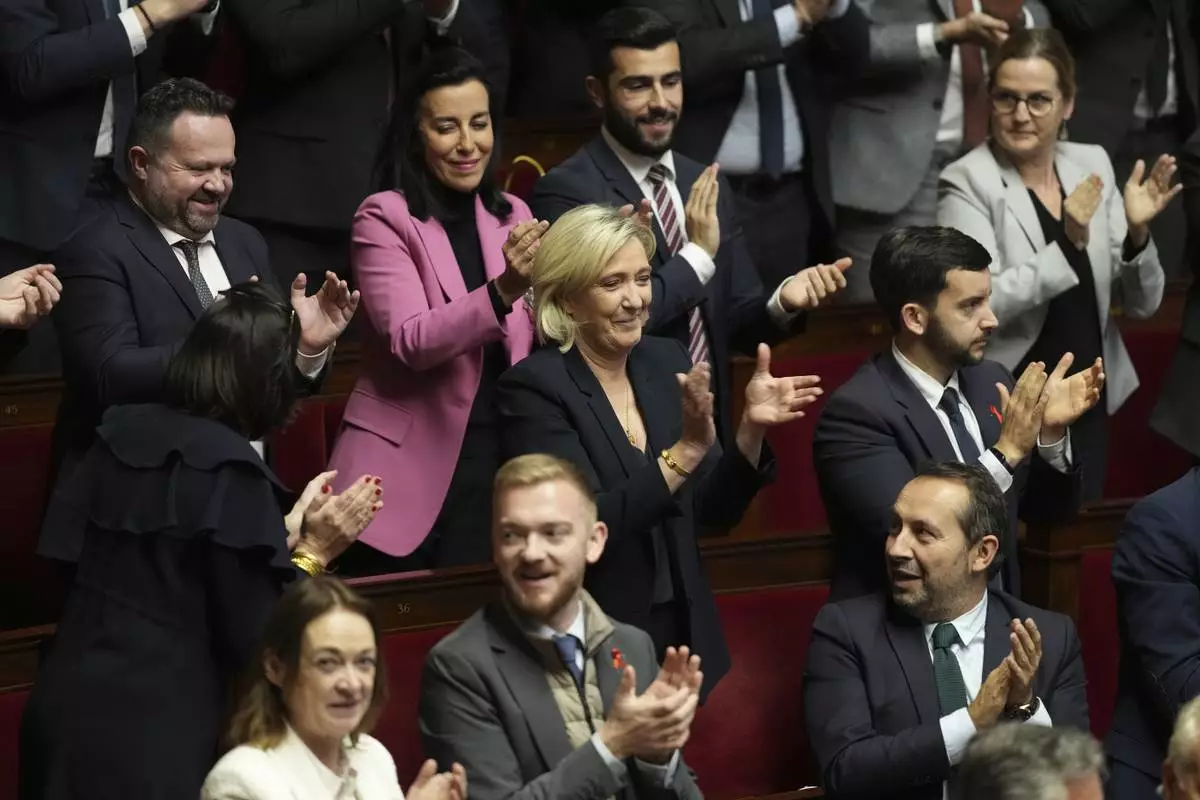
French far-right leader Marine Le Pen, center, applauds with other National Rally parliament members during conservative lawmaker Eric Ciotti's speech prior to a vote on a no-confidence motion that could bring him down and his cabinet for the first time since 1962, Wednesday, Dec. 4, 2024 the National Assembly in Paris. (AP Photo/Michel Euler)
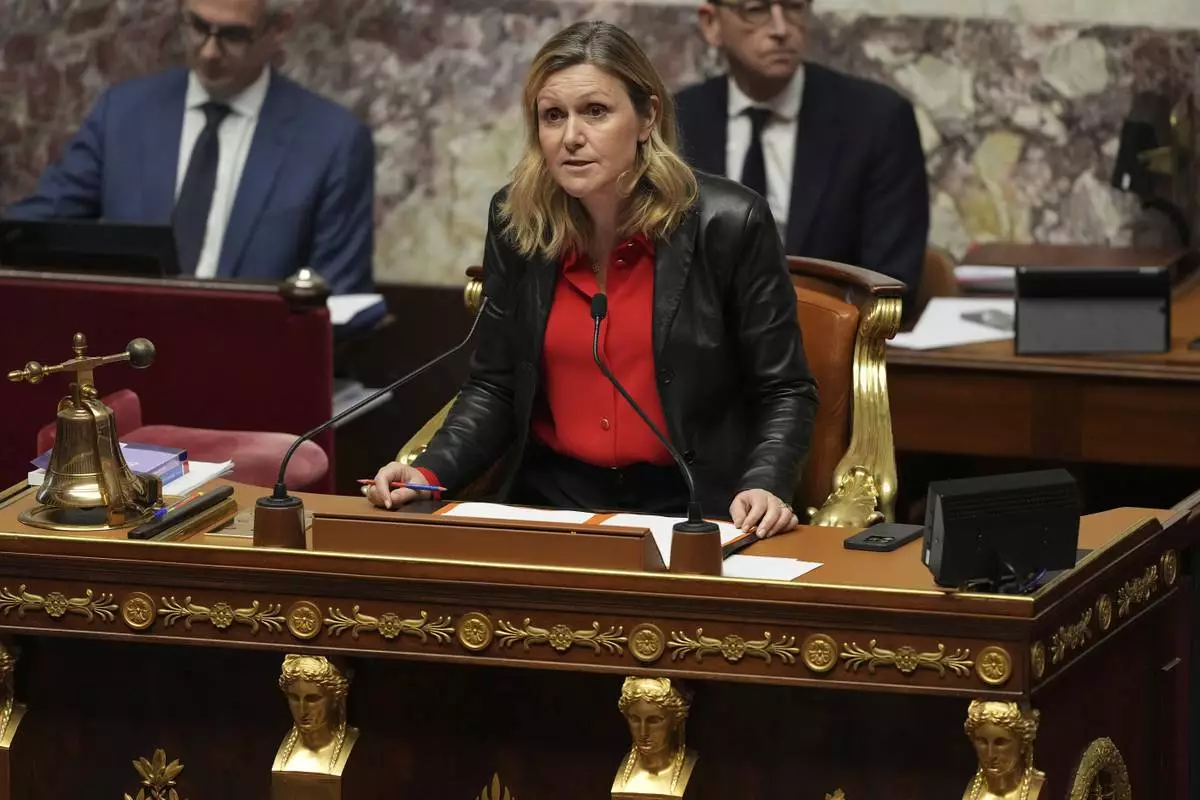
National Assembly president Yaël Braun-Pivet announces the results after France's far-right and left-wing lawmakers joined together to vote a no-confidence motion prompted by budget disputes that forces Prime Minister Michel Barnier to resign, Wednesday, Dec. 4, 2024 in Paris. (AP Photo/Michel Euler)

French far-right leader Marine Le Pen poses prior to an interview on French TV channel TF1, in Boulogne-Billancourt, outside Paris, Wednesday, Dec. 4, 2024 after France's far-right and left-wing lawmakers joined together to vote a no-confidence motion prompted by budget disputes that forces Prime Minister Michel Barnier to resign. (Stephane de Sakutin, Pool via AP)

French far-right leader Marine Le Pen poses prior to an interview on French TV channel TF1, in Boulogne-Billancourt, outside Paris, Wednesday, Dec. 4, 2024 after France's far-right and left-wing lawmakers joined together to vote a no-confidence motion prompted by budget disputes that forces Prime Minister Michel Barnier to resign. (Stephane de Sakutin, Pool via AP)
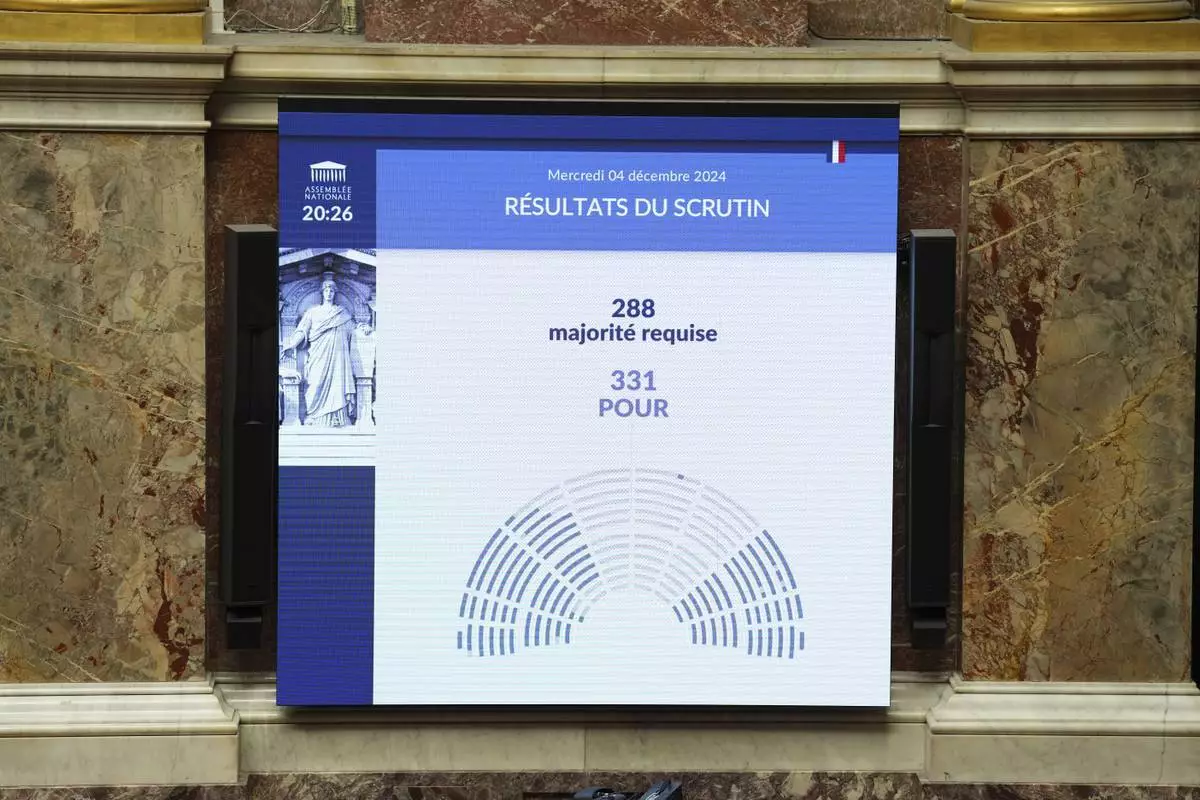
A scoreboard at the National Assembly shows the results of a no-confidence motion vote prompted by budget disputes that forces Prime Minister Michel Barnier to resign, Wednesday, Dec. 4, 2024 in Paris. (AP Photo/Michel Euler)
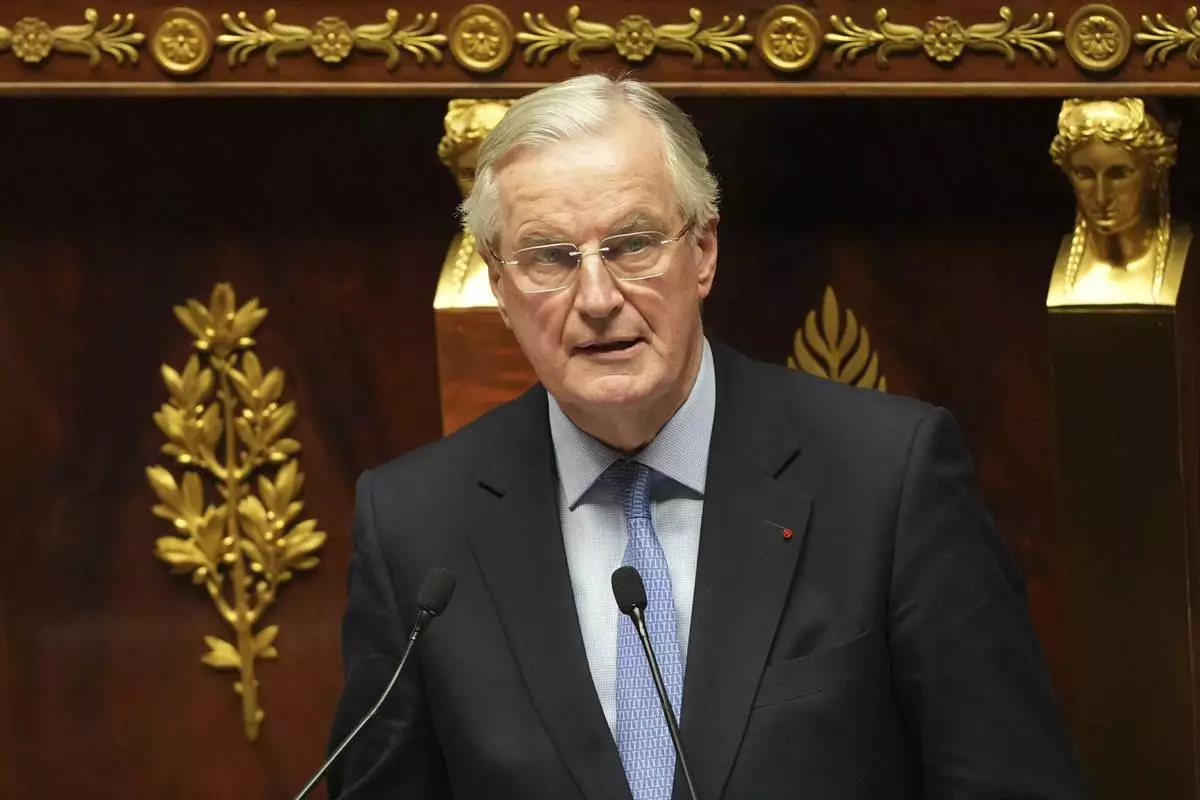
French Prime Minister Michel Barnier addresses the National Assembly prior to a vote on a no-confidence motion that could bring him down and his cabinet for the first time since 1962, Wednesday, Dec. 4, 2024 in Paris. (AP Photo/Michel Euler)
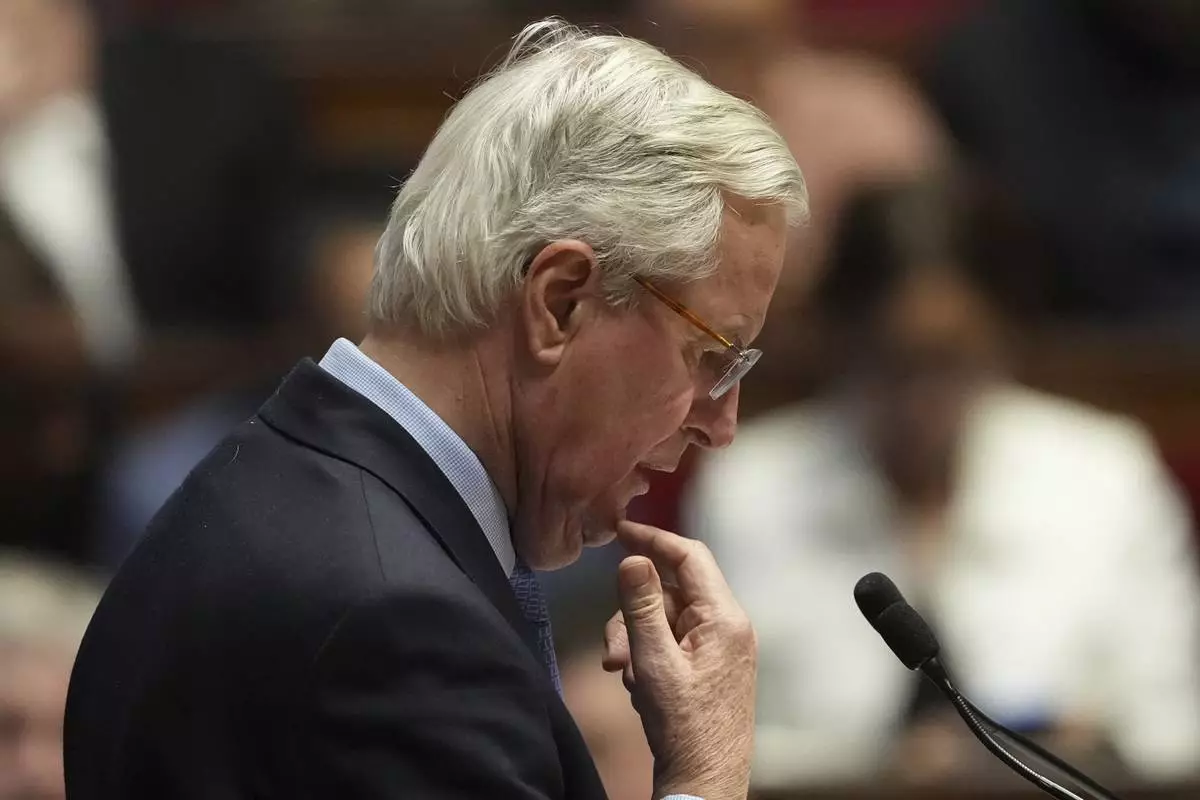
French Prime Minister Michel Barnier addresses the National Assembly prior to a vote on a no-confidence motion that could bring him down and his cabinet for the first time since 1962, Wednesday, Dec. 4, 2024 in Paris. (AP Photo/Michel Euler)
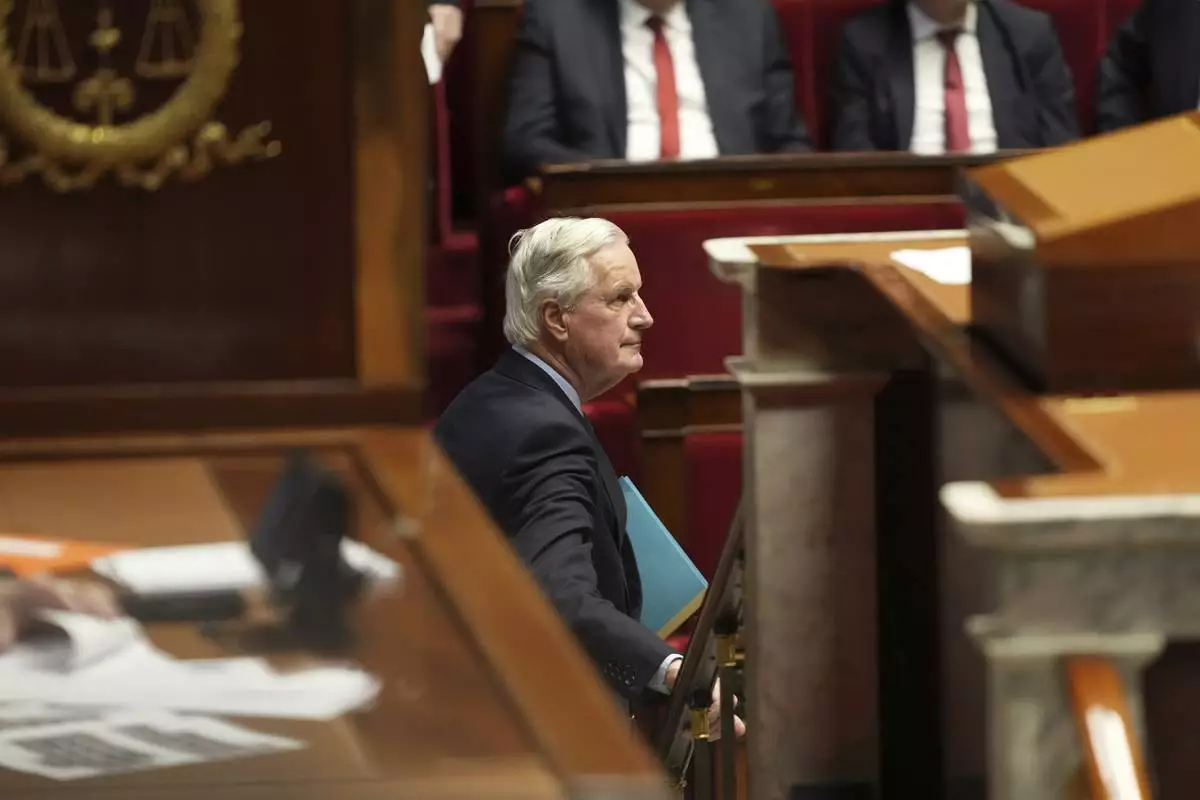
French Prime Minister Michel Barnier leaves after addressing the National Assembly prior to a vote on a no-confidence motion that could bring him down and his cabinet for the first time since 1962, Wednesday, Dec. 4, 2024 in Paris. (AP Photo/Michel Euler)
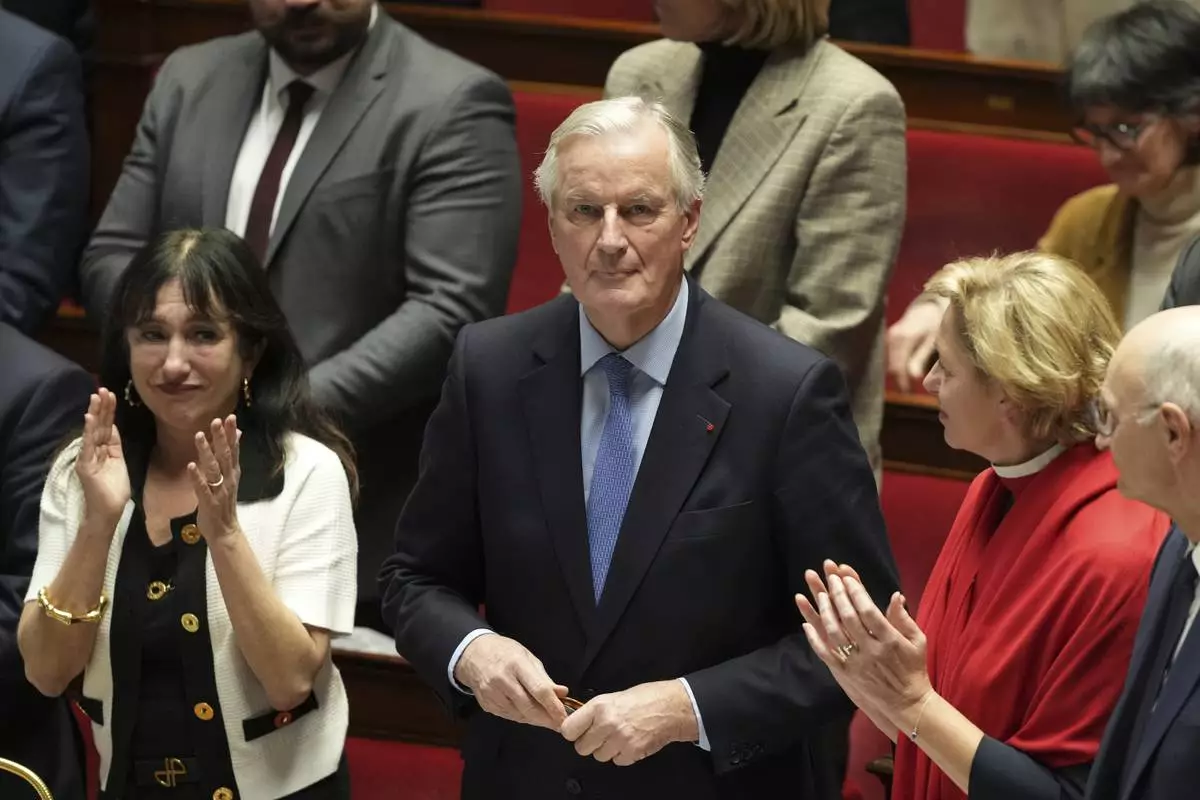
French Prime Minister Michel Barnier gets applause from ministers after addressing the National Assembly prior to a vote on a no-confidence motion that could bring him down and his cabinet for the first time since 1962, Wednesday, Dec. 4, 2024 in Paris. (AP Photo/Michel Euler)
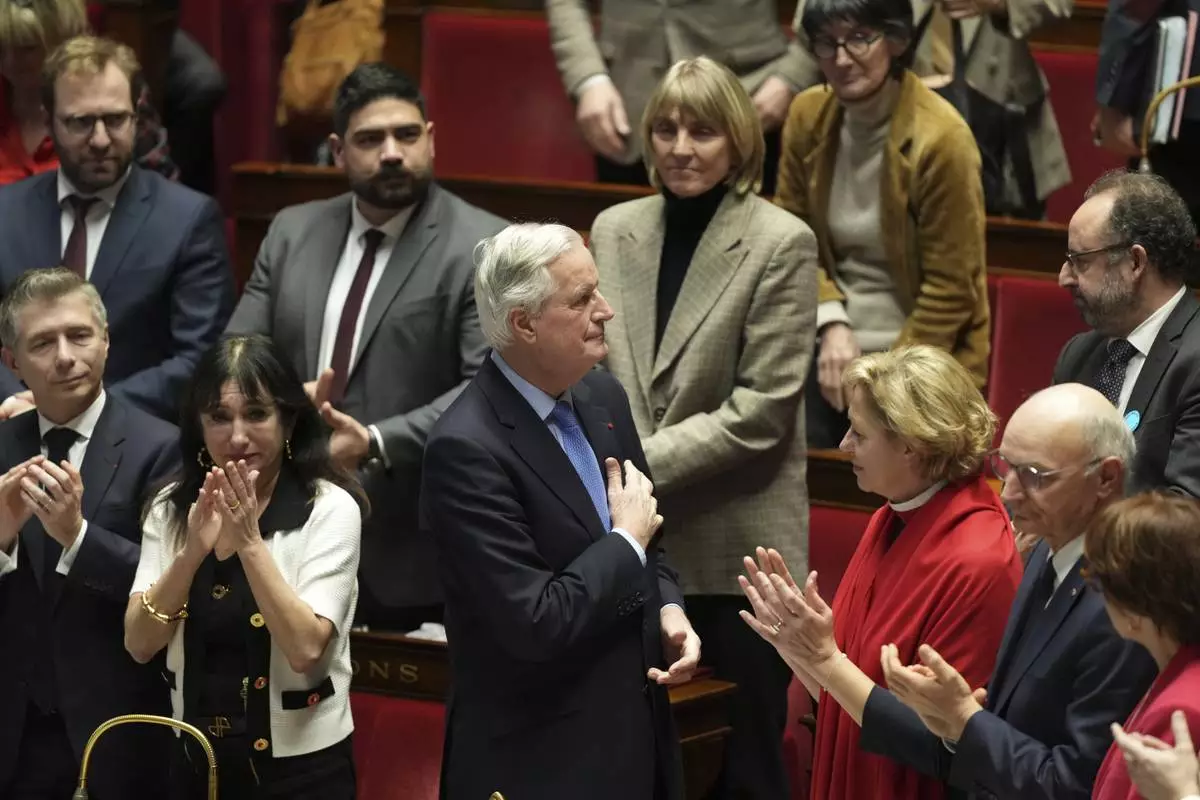
French Prime Minister Michel Barnier gets applause from ministers and parliament members after addressing the National Assembly prior to a vote on a no-confidence motion that could bring him down and his cabinet for the first time since 1962, Wednesday, Dec. 4, 2024 in Paris. (AP Photo/Michel Euler)
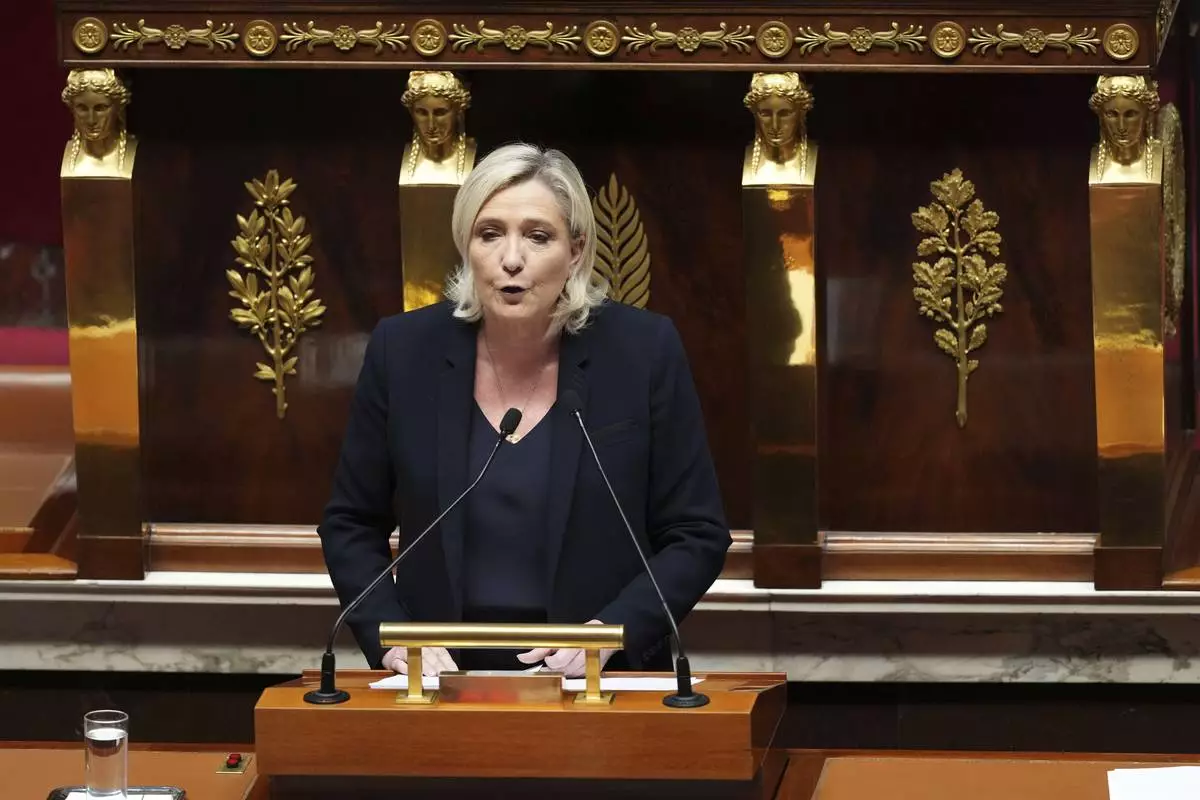
French far-right leader Marine Le Pen speaks at the National Assembly prior to a no-confidence vote that could bring down the Prime Minister and the government for the first time since 1962, Wednesday, Dec. 4, 2024 in Paris. (AP Photo/Michel Euler)

French far-left France Unbowed party parliament member Eric Coquerel speaks at the National Assembly prior to a no-confidence vote that could bring down the Prime Minister and the government for the first time since 1962, Wednesday, Dec. 4, 2024 in Paris. (AP Photo/Michel Euler)

French far-left leader Jean-Luc Melenchon listens to speeches rom the tribunes at the National Assembly prior to a no-confidence vote that could bring down the Prime Minister and the government for the first time since 1962, Wednesday, Dec. 4, 2024 in Paris. (AP Photo/Michel Euler)

French far-left leader Jean-Luc Melenchon, left, listens to speeches from the tribunes at the National Assembly prior to a no-confidence vote that could bring down the Prime Minister and the government for the first time since 1962, Wednesday, Dec. 4, 2024 in Paris. (AP Photo/Michel Euler)
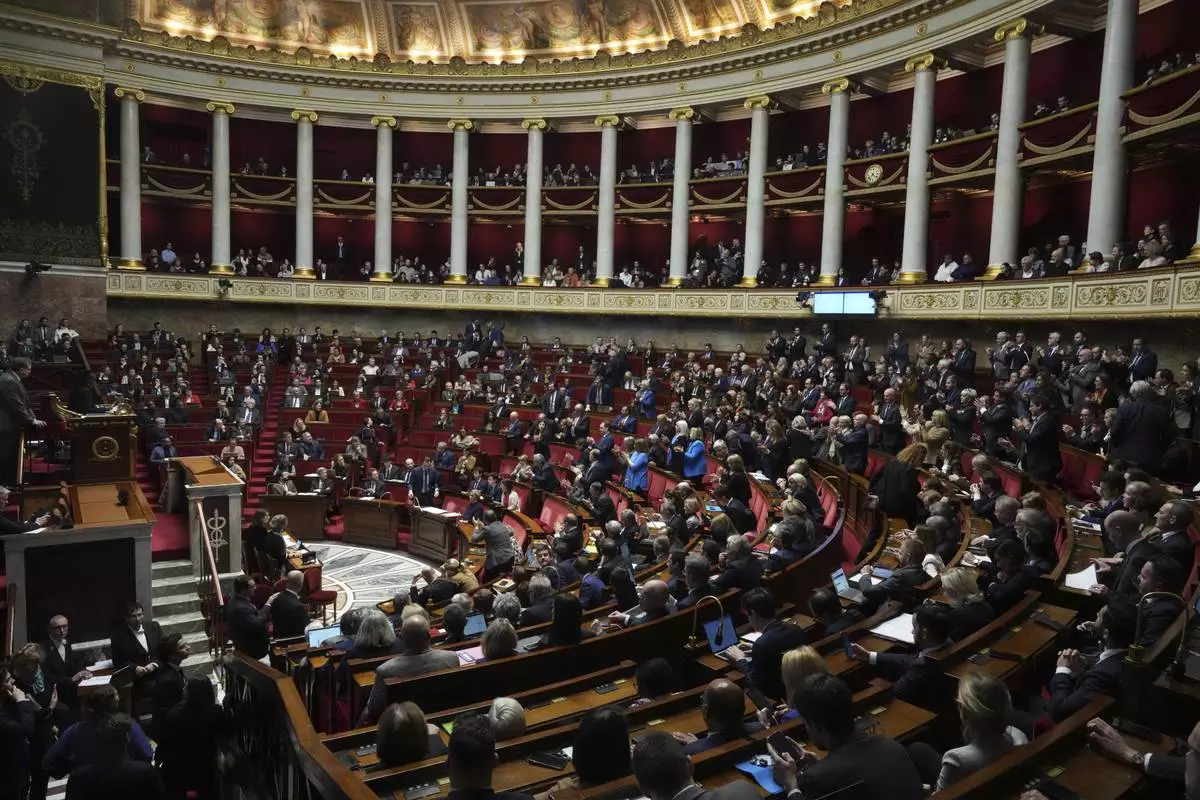
Lawmakers convene at the National Assembly during a debate and prior to a no-confidence vote that could bring down the Prime Minister and the government for the first time since 1962, Wednesday, Dec. 4, 2024 in Paris. (AP Photo/Michel Euler)
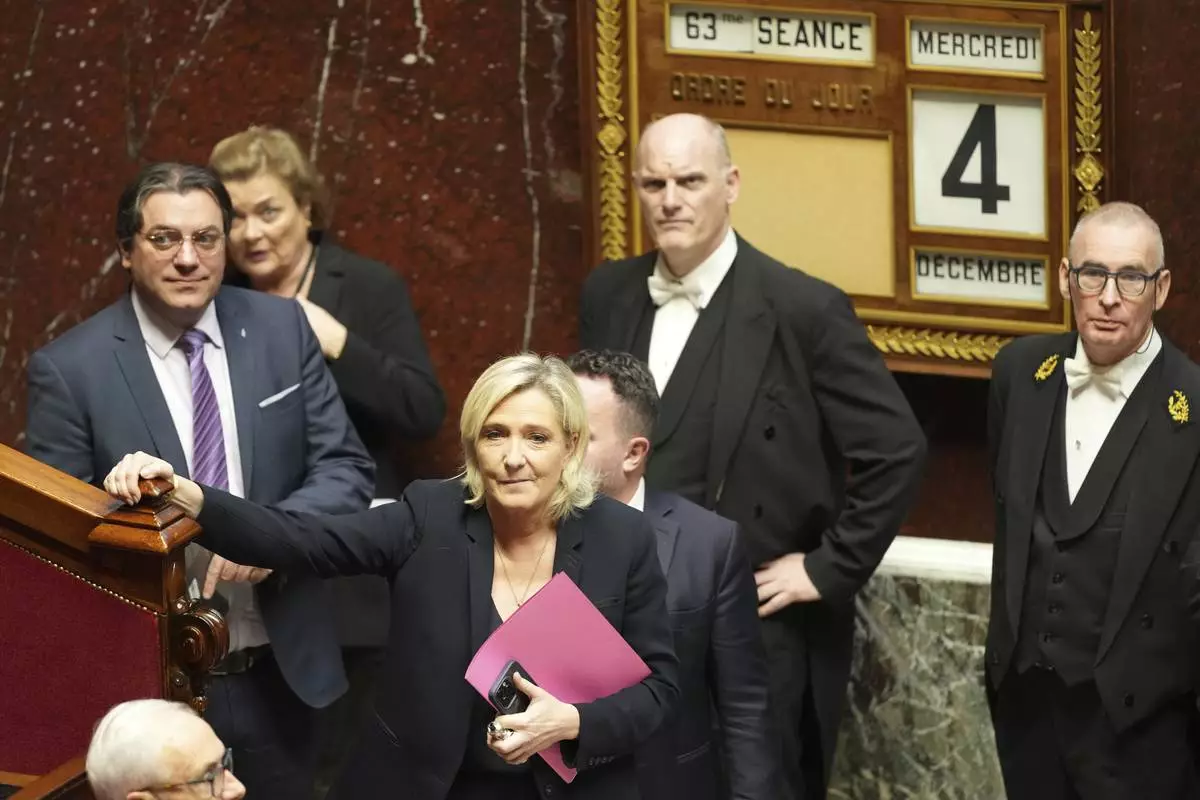
French far-right leader Marine Le Pen arrives to deliver her speech at the National Assembly prior to a no-confidence vote that could bring down the Prime Minister and the government for the first time since 1962, Wednesday, Dec. 4, 2024 in Paris. (AP Photo/Michel Euler)

French far-right leader Marine Le Pen delivers her speech at the National Assembly prior to a no-confidence vote that could bring down the Prime Minister and the government for the first time since 1962, Wednesday, Dec. 4, 2024 in Paris. (AP Photo/Michel Euler)
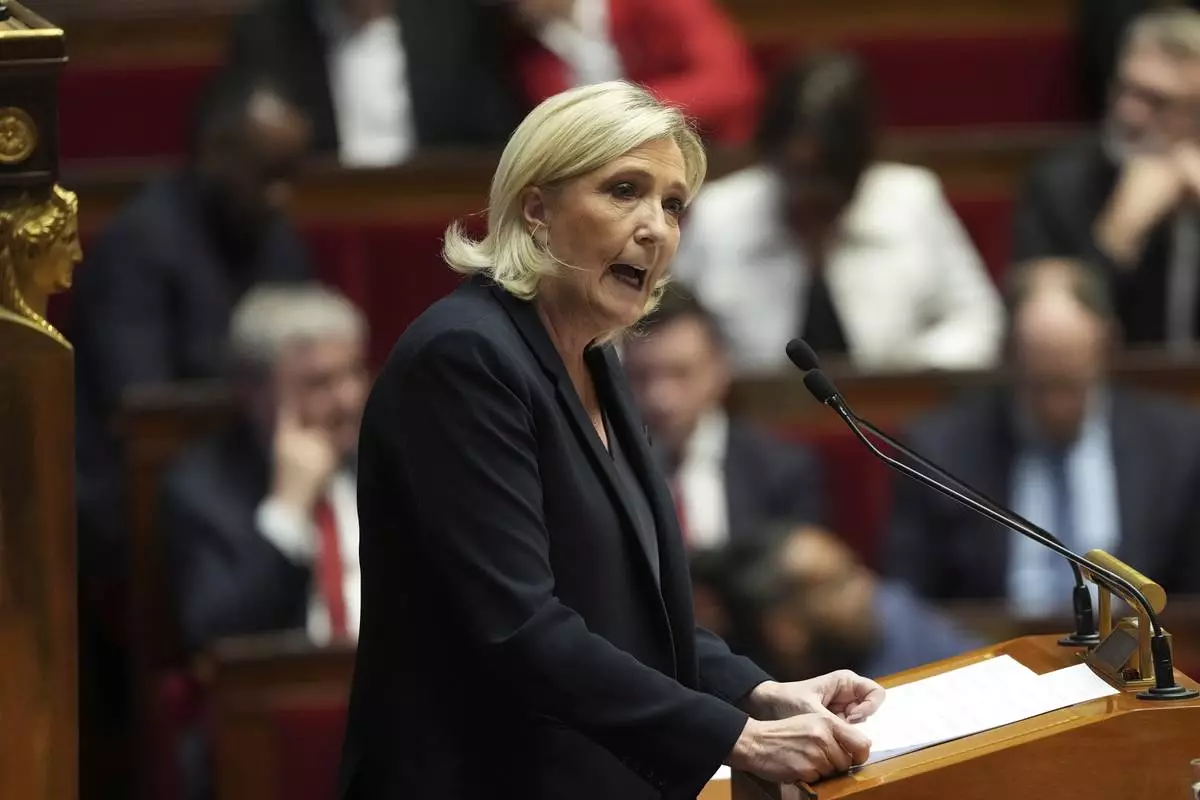
French far-right leader Marine Le Pen delivers her speech at the National Assembly prior to a no-confidence vote that could bring down the Prime Minister and the government for the first time since 1962, Wednesday, Dec. 4, 2024 in Paris. (AP Photo/Michel Euler)
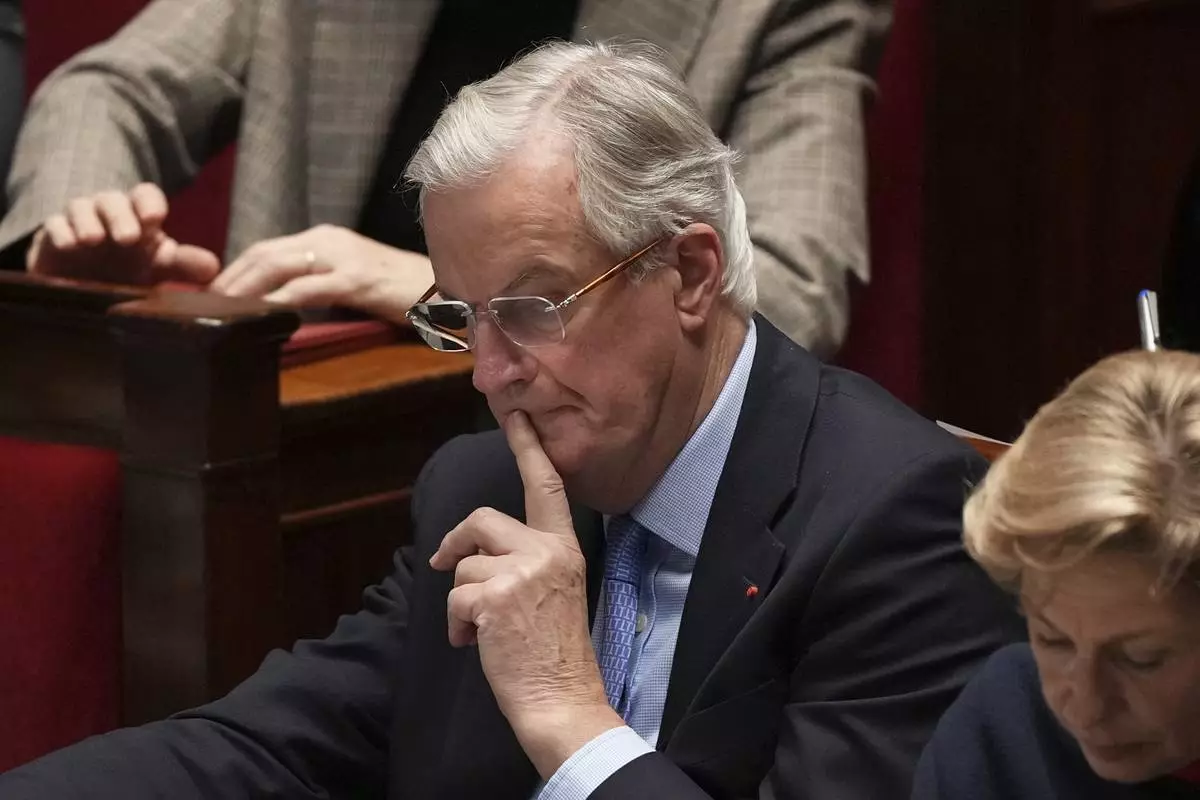
French Prime Minister Michel Barnier listens to speeches at the National Assembly prior to a no-confidence vote that could bring down the Prime Minister and the government for the first time since 1962, Wednesday, Dec. 4, 2024 in Paris. (AP Photo/Michel Euler)
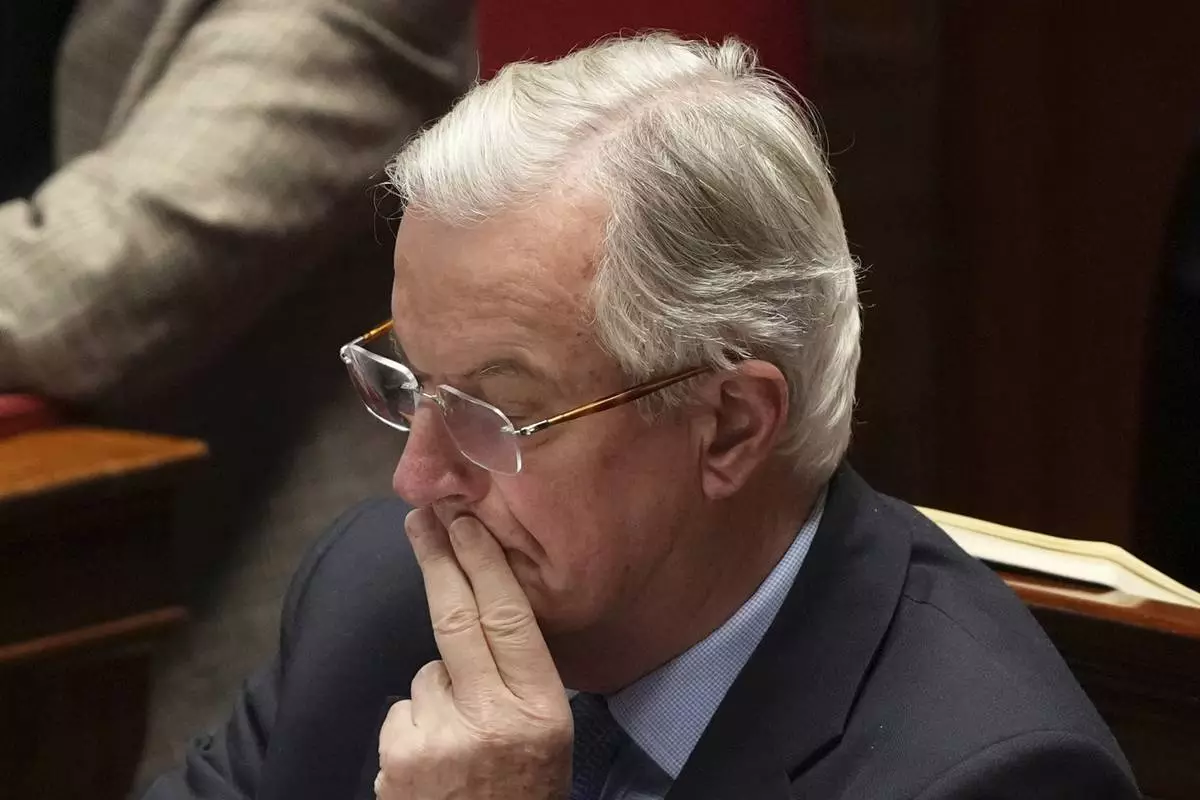
French Prime Minister Michel Barnier listens to speeches at the National Assembly prior to a no-confidence vote that could bring down the Prime Minister and the government for the first time since 1962, Wednesday, Dec. 4, 2024 in Paris. (AP Photo/Michel Euler)
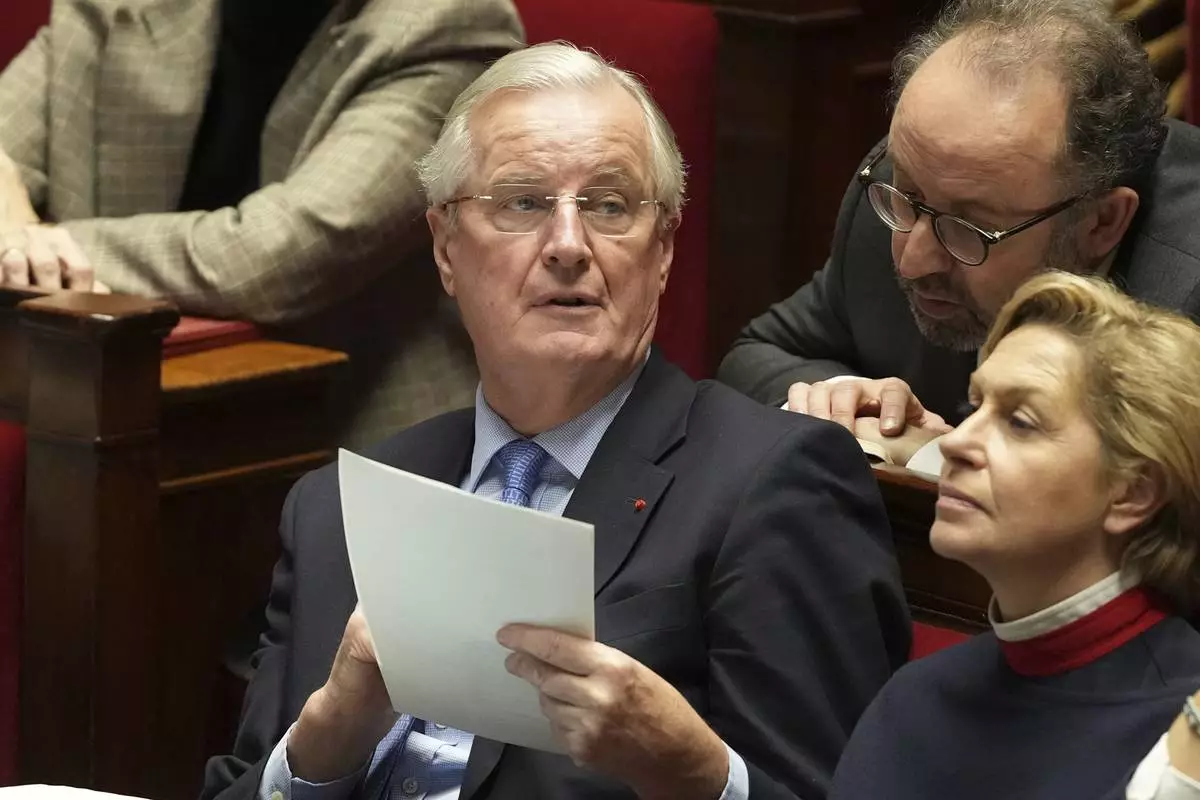
French Prime Minister Michel Barnier holds a document during speeches at the National Assembly prior to a no-confidence vote that could bring down the Prime Minister and the government for the first time since 1962, Wednesday, Dec. 4, 2024 in Paris. (AP Photo/Michel Euler)
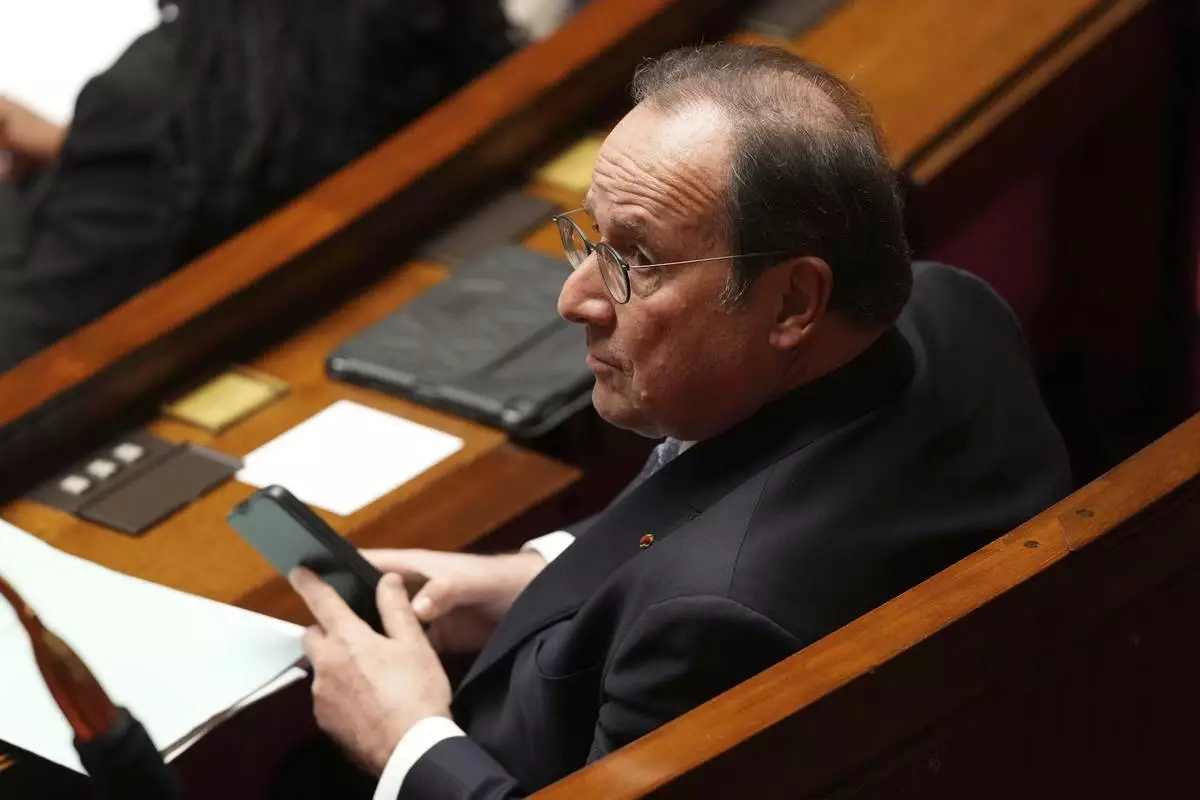
Former French President and now socialist party parliament member Francois Hollande sits at the National Assembly before French lawmakers vote on a no-confidence motion that could bring down the Prime Minister and the government for the first time since 1962, Wednesday, Dec. 4, 2024 in Paris. (AP Photo/Michel Euler)
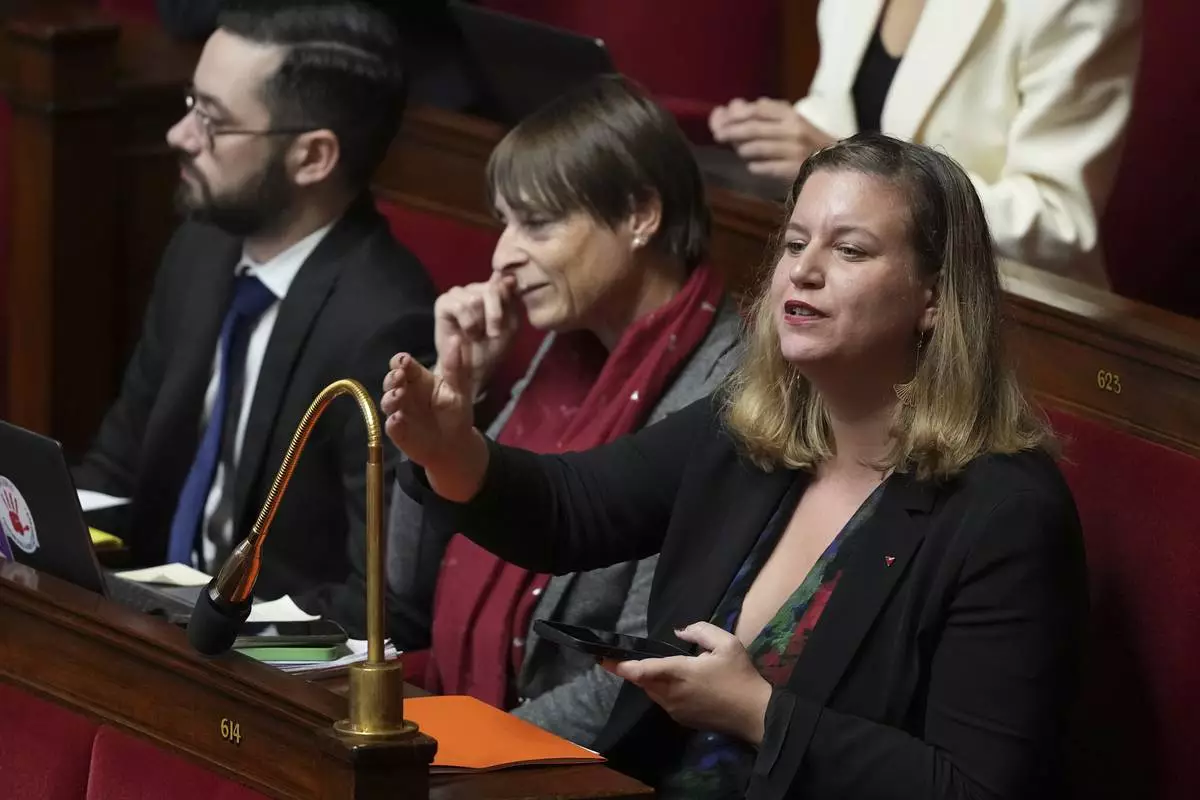
French far-left France Unbowed party parliament group president Mathilde Panot, right, gestures at the National Assembly before French lawmakers vote on a no-confidence motion that could bring down the Prime Minister and the government for the first time since 1962, Wednesday, Dec. 4, 2024 in Paris. (AP Photo/Michel Euler)

French far-right leader Marine Le Pen, right, talks with a National Rally parliament member at the National Assembly before French lawmakers vote on a no-confidence motion that could bring down the Prime Minister and the government for the first time since 1962, Wednesday, Dec. 4, 2024 in Paris. (AP Photo/Michel Euler)
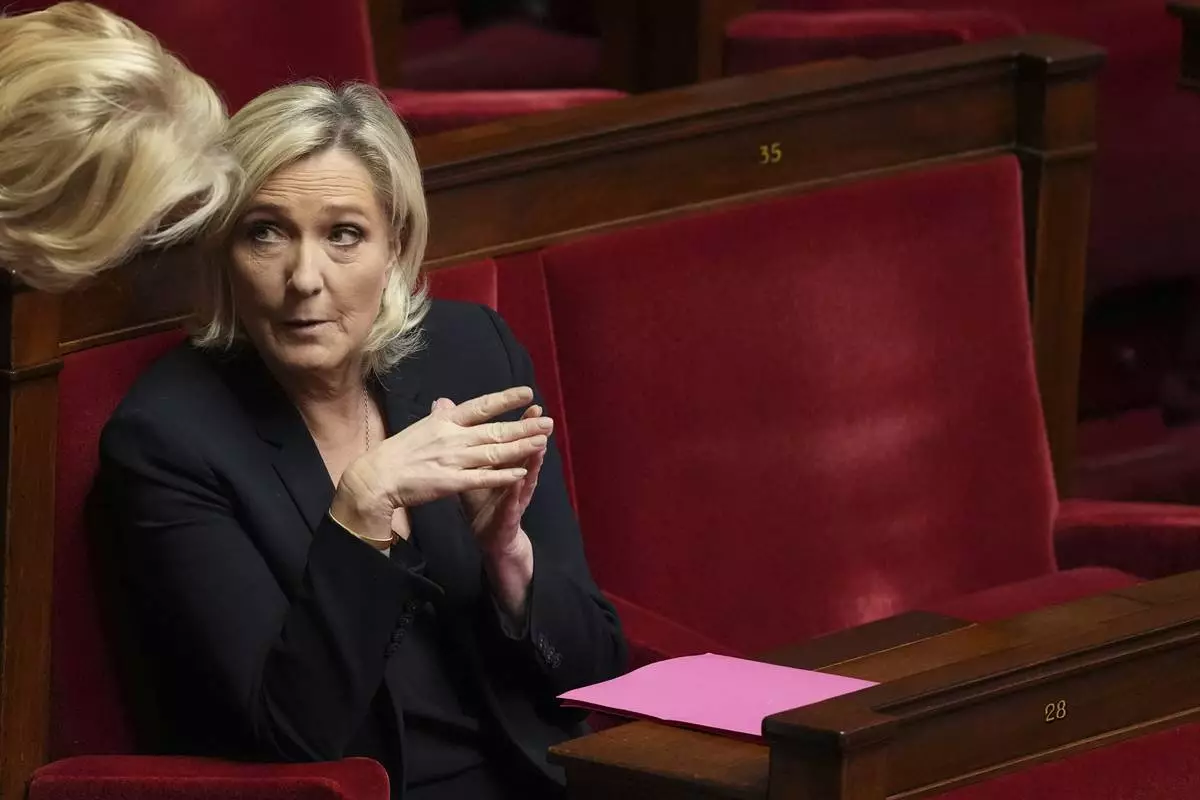
French far-right leader Marine Le Pen sits at the National Assembly before French lawmakers vote on a no-confidence motion that could bring down the Prime Minister and the government for the first time since 1962, Wednesday, Dec. 4, 2024 in Paris. (AP Photo/Michel Euler)
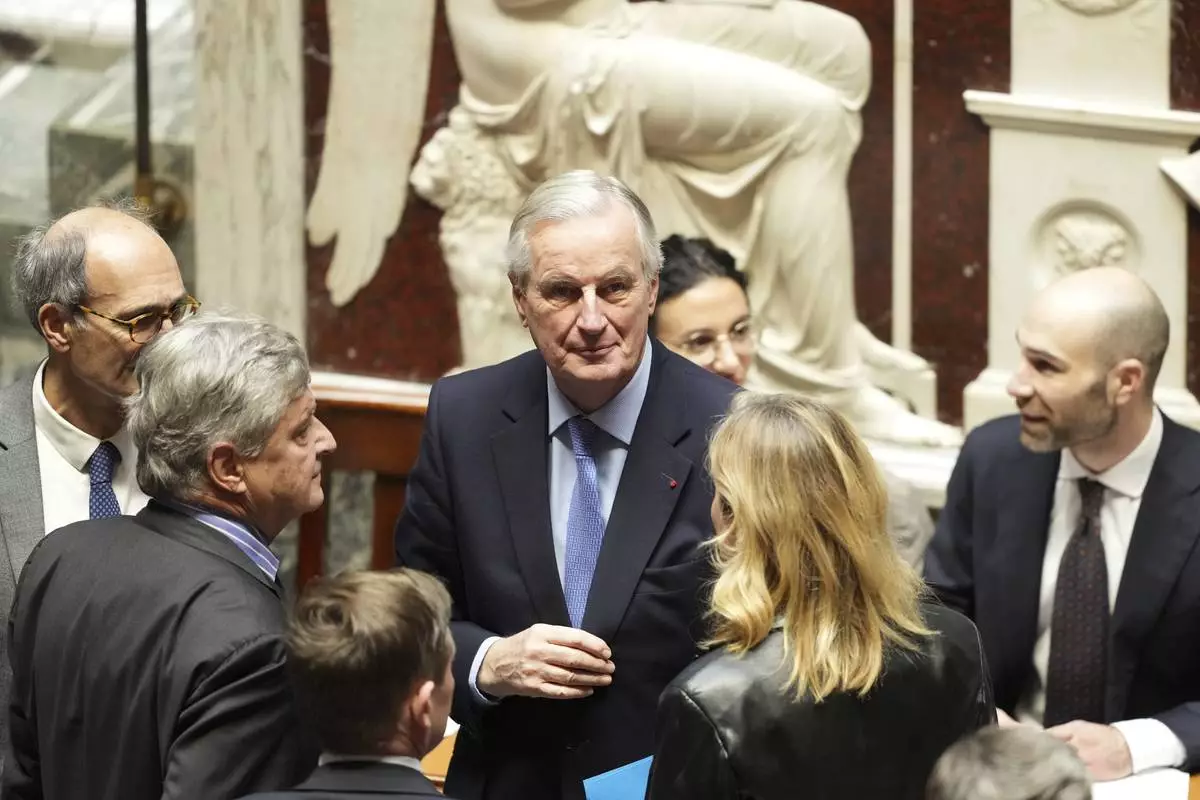
French Prime Minister Michel Barnier, center, talks to people at the National Assembly before French lawmakers vote on a no-confidence motion that could bring down the prime minister and the government for the first time since 1962, Wednesday, Dec. 4, 2024 in Paris. (AP Photo/Michel Euler)
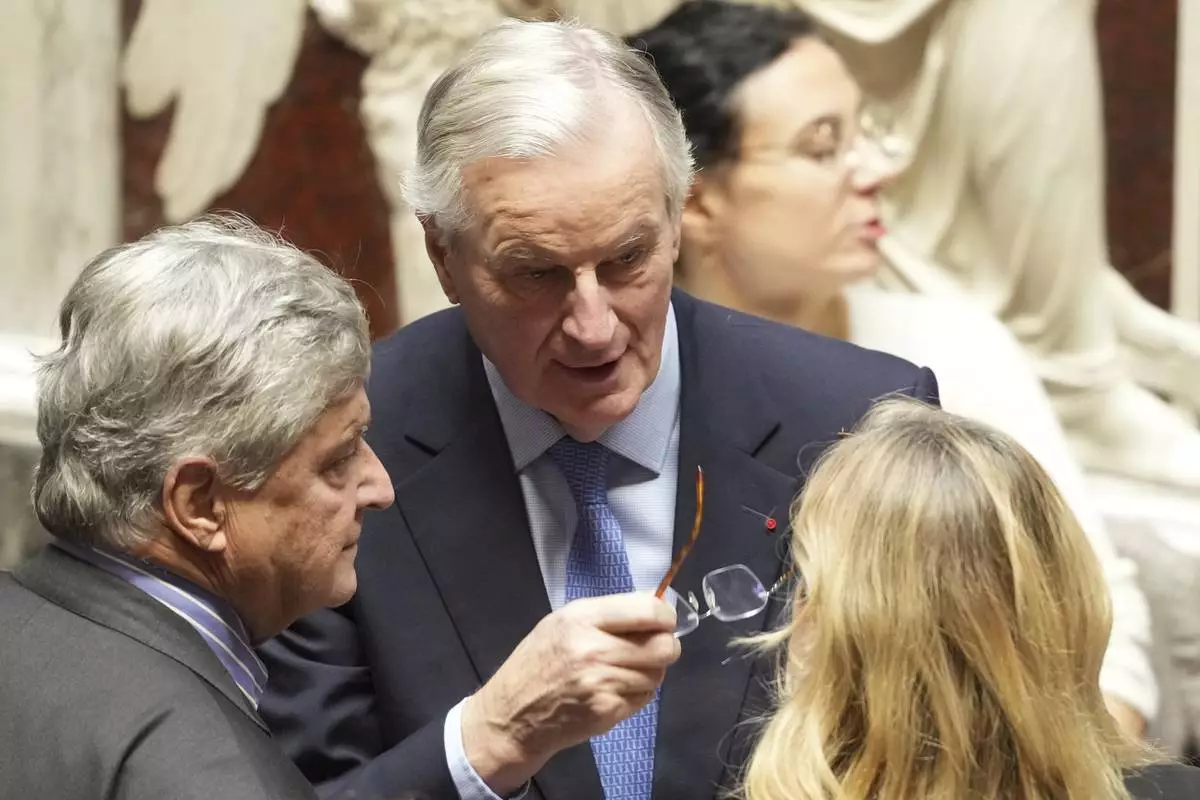
French Prime Minister Michel Barnier, center, talks to people at the National Assembly before French lawmakers vote on a no-confidence motion that could bring down the prime minister and the government for the first time since 1962, Wednesday, Dec. 4, 2024 in Paris. (AP Photo/Michel Euler)
It is an ambitious social experiment of our moment in history — one that experts say could accomplish something that parents, schools and other governments have attempted with varying degrees of success: keeping kids off social media until they turn 16.
Australia's new law, approved by its Parliament last week, is an attempt to swim against many tides of modern life — formidable forces like technology, marketing, globalization and, of course, the iron will of a teenager. And like efforts of the past to protect kids from things that parents believe they're not ready for, the nation's move is both ambitious and not exactly simple, particularly in a world where young people are often shaped, defined and judged by the online company they keep.
The ban won't go into effect for another year. But how will Australia be able to enforce it? That's not clear, nor will it be easy. TikTok, Snapchat and Instagram have become so ingrained in young people's lives that going cold turkey will be difficult.
Other questions loom. Does the ban limit kids' free expression and — especially for those in vulnerable groups — isolate them and curtail their opportunity to connect with members of their community? And how will social sites verify people's ages, anyway? Can't kids just get around such technicalities, as they so often do?
This is, after all, the 21st century — an era when social media is the primary communications tool for most of those born in the past 25 years who, in a fragmented world, seek the common cultures of trends, music and memes. What happens when big swaths of that fall away?
Is Australia's initiative a good, long-time-coming development that will protect the vulnerable, or could it become a well-meaning experiment with unintended consequences?
The law will make platforms including TikTok, Facebook, Snapchat, Reddit, X and Instagram liable for fines of up to 50 million Australian dollars ($33 million) for systemic failures to prevent children younger than 16 from holding accounts. “It’s clear that social media companies have to be held accountable, which is what Australia is trying to do,” said Jim Steyer, president and CEO of the nonprofit Common Sense Media.
Leaders and parents in countries around the world are watching Australia’s policy closely as many seek to protect young kids from the internet's dangerous corners — and, not incidentally, from each other. Most nations have taken different routes, from parental consent requirements to minimum age limits.
Many child safety experts, parents and even teens who have waited to get on social media consider Australia's move a positive step. They say there’s ample reason to ensure that children wait.
“What’s most important for kids, just like adults, is real human connection. Less time alone on the screen means more time to connect, not less," said Julie Scelfo, the founder of Mothers Against Media Addiction, or MAMA, a grassroots group of parents aimed at combatting the harms of social media to children. “I’m confident we can support our kids in interacting in any number of ways aside from sharing the latest meme.”
The harms to children from social media have been well documented in the two decades since Facebook’s launch ushered in a new era in how the world communicates. Kids who spend more time on social media, especially as tweens or young teenagers, are more likely to experience depression and anxiety, according to multiple studies — though it is not yet clear if there is a causal relationship.
What's more, many are exposed to content that is not appropriate for their age, including pornography and violence, as well as social pressures about body image and makeup. They also face bullying, sexual harassment and unwanted advances from their peers as well as adult strangers. Because their brains are not fully developed, teenagers, especially younger ones the law is focused on, are also more affected by social comparisons than adults, so even happy posts from friends can send them into a negative spiral.
Many major initiatives, particularly those aimed at social engineering, can produce side effects — often unintended. Could that happen here? What, if anything, do kids stand to lose by separating kids and the networks in which they participate?
Paul Taske, associate director of litigation at the tech lobbying group NetChoice, says he considers the ban “one of the most extreme violations of free speech on the world stage today" even as he expressed relief that the First Amendment prevents such law in the United States
"These restrictions would create a massive cultural shift,” Taske said.
“Not only is the Australian government preventing young people from engaging with issues they’re passionate about, but they’re also doing so even if their parents are ok with them using digital services," he said. "Parents know their children and their needs the best, and they should be making these decisions for their families — not big government. That kind of forcible control over families inevitably will have downstream cultural impacts.”
David Inserra, a fellow for Free Expression and Technology, Cato Institute, called the bill “about as useful as an ashtray on a motorbike” in a recent blog post. While Australia's law doesn't require “hard verification” such as an uploaded ID, he said, it calls for effective “age assurance.” He said no verification system can ensure accuracy while also protecting privacy and not impacting adults in the process.
Privacy advocates have also raised concerns about the law's effect on online anonymity, a cornerstone of online communications — and something that can protect teens on social platforms.
“Whether it be religious minorities and dissidents, LGBTQ youth, those in abusive situations, whistleblowers, or countless other speakers in tricky situations, anonymous speech is a critical tool to safely challenge authority and express controversial opinions,” Inserra said.
A spot check of kids at one mall in the Australian city of Brisbane on Wednesday didn't turn up a great deal of worry, though.
“Social media is still important because you get to talk to people, but I think it’s still good that they’re like limiting it,” said Swan Son, a 13-year-old student at Brisbane State High School. She said she has had limited exposure to social media and wouldn’t really miss it for a couple of years. Her parents already enforce a daily one-hour limit. And as for her friends? “I see them at school every day, so I think I’ll be fine.”
Conor Negric, 16, said he felt he’d dodged a bullet because of his age. Still, he considers the law reasonable. “I think 16 is fine. Some kids, I know some kids like 10 who’re on Instagram, Snapchat. I only got Instagram when I was 14."
His mom, Sive Negric, who has two teenage sons, said she was happy for her boys to avoid exposure to social media too early: “That aspect of the internet, it’s a bit `meanland.'"
Parents in Britain and across Europe earlier this year organized on platforms such as WhatsApp and Telegram to promise not to buy smartphones for children younger than 12 or 13. This approach costs almost no money and requires no government enforcement. In the United States, some parents are keeping kids off social media either informally or as part of an organized campaign such as Wait Until 8th, a group that helps parents delay kids' access to social media and phones.
This fall, Norway announced plans to ban kids under 15 from using social media, while France is testing a smartphone ban for kids under 15 in a limited number of schools — a policy that could be rolled out nationwide if successful.
U.S. lawmakers have held multiple congressional hearings — most recently in January — on child online safety. Still, the last federal law aimed at protecting children online was enacted in 1998, six years before Facebook’s founding. In July, the U.S. Senate overwhelmingly passed legislation designed to protect children from dangerous online content, pushing forward with what would be the first major effort by Congress in decades to hold tech companies more accountable. But the Kids Online Safety Act has since stalled in the House.
While several states have passed laws requiring age verification, those are stuck in court. Utah became the first state to pass laws regulating children’s social media use in 2023. In September, a judge issued the preliminary injunction against the law, which would have required social media companies to verify the ages of users, apply privacy settings and limit some features. NetChoice has also obtained injunctions temporarily halting similar laws in several other states.
And last May, U.S. Surgeon General Vivek Murthy said there is insufficient evidence to show social media is safe for kids. He urged policymakers to treat social media like car seats, baby formula, medication and other products children use.
“Why should social media products be any different? Scelfo said. “Parents cannot possibly bear the entire responsibility of keeping children safe online, because the problems are baked into the design of the products.”
Associated Press Writers John Pye in Brisbane, Australia and Laurie Kellman in London contributed to this story.
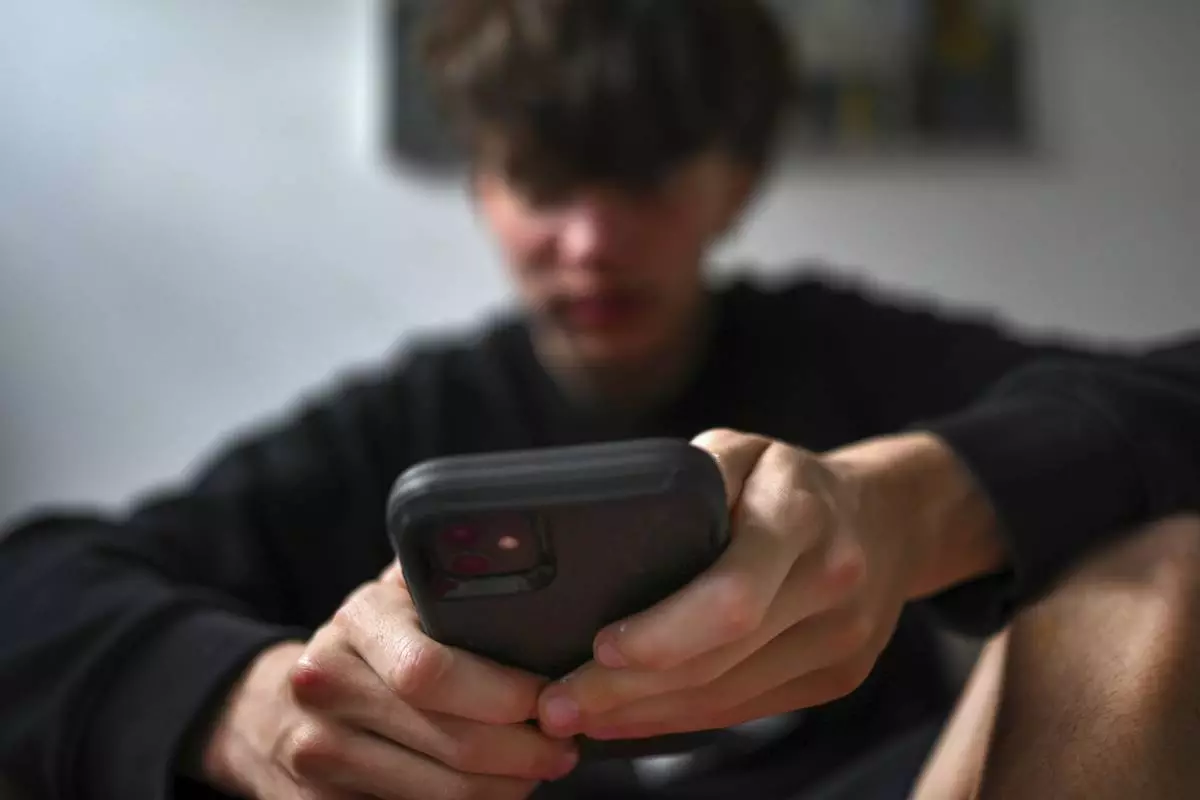
A teenager uses his mobile phone to access social media, Sydney, Wednesday, Nov. 13, 2024. (Dean Lewins/AAP Image VIA AP)





























